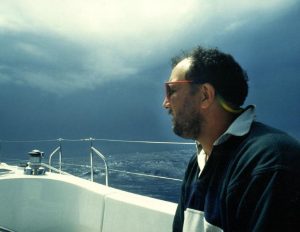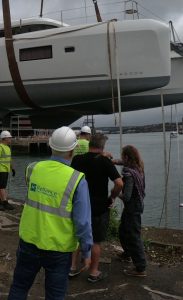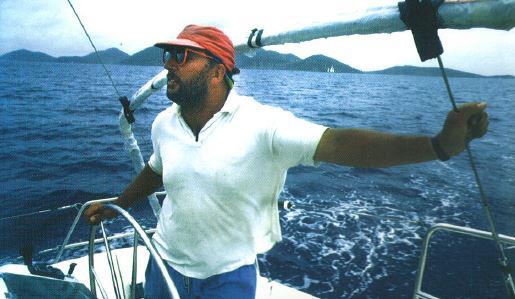“A great adventure”: Interview with Nick Irving, Managing Director
As Reliance winds down its yacht delivery services, Nick Irving looks back on these last 30 years of business and innovation.
Nick Irving founded Reliance Yacht Management in the 1980s. As a professional delivery skipper, he spotted a gap in the market for a centralised international yacht delivery service. Reliance has gone on to be a major player in the industry with private and corporate clients around the world, including The Catamaran Company, Groupe Beneteau and Navaboats. Now Nick reflects upon working as a yacht delivery skipper, setting up a business from scratch and looking towards the future.
What accomplishments are you most proud of from your time at Reliance Yacht Management?
I survived, I’m still here. One looks back reflectively on the business and sees that the result is not necessarily measurable in pounds and pence but in what has been achieved and influenced. The business has supported me and my family, but it’s quite humbling to see how many other individuals have worked for Reliance – office staff, captains, crew. It’s very humbling to see where we all started and how much we have all grown and progressed within the yachting industry, because of Reliance Yacht Management.
One doesn’t realise it at the time, but it has been a great adventure.
Do you have any particular highlights or stories that jump out at you when reflecting on your time at Reliance?
Back in the 1980s, when we started Reliance, the technology that we use now to coordinate international deliveries was only in its infancy. Email didn’t exist and the internet wasn’t common. In the beginning, I worked from my brother’s dining room table, I cycled over a mile to receive faxes from the stationary shop. We didn’t know any better. I was not going to pay for a second line to come into the house to have a fax.
What originally led you to set up Reliance?
Various reasons. I was working as a delivery captain, travelling the world, while also working as a security guard in London. So one week, I could be escorting the Queen around Earl’s court, and the following week, I could be on a yacht going to Greece; four months later I’m with Suzi Quatro at Crystal Palace, then I’m off to Antigua. It was a good lifestyle. Fun, unpredictable, no responsibilities. But after a while it became mundane. One time I was travelling across the Pacific with this family, helping them sail their boat; after reaching another tropical island, I wasn’t even interested in going ashore. It was just another beach, another palm tree. So I thought, if that’s the way I’m feeling, then it’s time for a change.

What was the step from needing a change to enacting that change?
While I was completing a yacht delivery from France to Tahiti, the company I was working for at the time folded. There were no satellite phones or tracking units, so we only found out once we delivered the boat. The client was a major charter company based in Florida that I had delivered many boats for over the years. They needed someone to step in and coordinate deliveries. I approached them as someone who knew their boats, their destinations, the captains and the crew, and suggested that they give me a chance. Overnight, I had probably the biggest client in the industry. I was looking for a new challenge and the timing was perfect, so it couldn’t have been a better start.
It can be easy to underestimate the delivery arm of yacht chartering and sales, how difficult it can be to organise. But it sounds like this client understood how big of a task it was.
Being a delivery captain is very different from running a delivery business. People have often confused the two, but my work is more about managing people, than managing boats. Clients need someone to coordinate the boats, the captains, the logistics, keep them updated about any problems, but more importantly, solve those problems for them.
The job also needed someone who was a sailor. I could manage the captains because I knew the boats, the routes and destinations. I wasn’t asking captains to do anything that I hadn’t done or wouldn’t have done myself. But I was also ready to move on from sailing. I stuck with the business and didn’t abandon the office every time there was a nice trip coming up. I paid other people to do that instead.
What were your goals setting up Reliance and do you feel like you’ve achieved them?
To see if I could do it. I had no idea, no clue, if I could. But I thought it would be fun to try. I couldn’t have predicted we’d still be here after 30 years.
Once Reliance became more established, did you still follow the same philosophy or did your goals change again?
I came to realise that what I had was something really valuable. I wasn’t necessarily aiming to be the biggest or the best in the world. Rather, I wanted to be the best I could be or the business could be, to not compare ourselves with other people, but to ourselves last year and then build on that.
You were never interested in developing or investing in bigger projects?
I did look at all these things: having an agent in every continent, franchising the brand, diversifying into sailing schools or satellite tracking. But I always came back to our core business of being a delivery service, a good delivery service. Had we expanded, I fear that our core values in bespoke customer service might have been lost. Much of our business depended upon strong, interpersonal relationships with both our clients and our captains. If I had other agents replicating that, then part of it would be lost.
What’s been the most enjoyable or satisfying part of running Reliance?
The clients, captains and crew, and the office staff: the human side of things. We’ve worked with some great people over the years. They’ve seen the company go through problems and successes, and they’ve been very loyal.
What’s been the most difficult or frustrating or upsetting part of running Reliance?
It’s impossible to be in business for nearly 30 years and not face difficulties. I have had various loses for many different reasons. It is easy to become frustrated and disheartened, trying to understand what went wrong or what could have been done better. The business has been through some very dark times, in that respect. But going back to the people, we’ve been fortunate that when we go through these difficult times, it’s been the clients and captains who have stayed and rallied around us. It’s very humbling.
What do you wish you would have known before setting up the company?
I think it was an advantage, actually, that I didn’t know anything. I didn’t know how to set up a business, about accountancy or creating contracts. But that was part of the adventure, learning how to make it work. I was trying to create something which hadn’t existed before, not officially. There was no one to copy. So I made it my own.
But would you have done anything differently? Knowing what you know now.
I certainly have no regrets about the way we did things. I’m very proud of the business. Perhaps I would have employed people earlier. I did eventually employ people to do the administration and accounts, but I was always very cautious. I never took people on board until I was confident that I’d done as much as I could myself first. I could have benefitted from surrounding myself with knowledgeable and talented people from the start, people who could show me how to run effective operations, rather than the other way around. But the business grew organically. I didn’t expand any sooner than I could manage.

What advice would you give to someone else looking to set up a similar business or about to embark on a similar venture?
I am being retained as a consultant for a company that is aiming to expand their delivery services. I will certainly be advising them to put in the procedures and policies sooner rather than later so they’re capable of managing large numbers, even if they aren’t there yet. Initially, I would say yes to a big contract, 30-40 boats, without any idea how I was going to manage it. But I always succeeded in the end. Make it easier for yourself. Assume you’re going to get the business and be ready for it.
Why are you deciding to wind down the company and your activity in the yachting industry?
They’re similar reasons as to why I stopped sailing. I took Reliance as far as I could possibly go. With sailing it was multiple transatlantics, transpacifics, numerous trips in the Med, North Sea and around Europe. I learnt to navigate with a sextant, piloted without GPS. Like sailing, through the business I have learnt a lot and rose to many challenges, but now I am ready for something new. I could continue, but I would just be marking time. It would go from something I was proud of to another mundane job. If I can’t get fired up about the business, then it’s probably not good for the business.
What’s the next step?
We’re still formulating and I’ve got lots of ideas. I’m currently being retained as a consultant by a few clients, advising them on delivery and logistics. For a couple of well-established clients, I will continue to manage their boats for as long as they need me to do that.
Do you have anything else that you would like to add?
Just that it’s been a real privilege to run this business and see tangibly how it impacts other people’s lives. It’s an honour and responsibility to employ and work with others. I’ve really enjoyed it. I’m very proud of what we built here.

